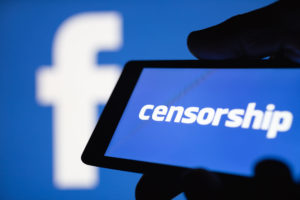What is a Public Forum?
When the founding fathers first wrote the United States Constitution, do you think they could have ever imagined such a public forum as the Internet or social media? The legal definition of public forum is “a place that has a long-standing tradition of being used for, is historically associated with, or has been dedicated by government act to the free exercise of the right to speech and public debate and assembly.” So, technically, Facebook, Instagram, and Twitter would not be considered a public forum by the government, but should they be? Or more interestingly, have they become public forums for purposes of internet defamation and free speech considerations?
The Public Forum Debate
In 2017, former U.S. Supreme Court Justice Anthony Kennedy, compared the Internet to a public forum in an opinion regarding the First Amendment case, Packingham v. North Carolina.
“While in the past there may have been difficulty in identifying the most important places (in a spatial sense) for the exchange of views, today the answer is clear. It is cyberspace—the “vast democratic forums of the Internet…” Kennedy wrote in his opinion to the court.
This insight from Justice Kennedy raises questions about how social media and the Internet should be treated as far as the government is concerned. It’s hard though, to fully address and act upon these questions and concerns because the government does not provide or own any of these social media sites.
Free Speech and Social Media
Facebook, a publicly-traded company, founded by Mark Zuckerberg, is one of the most widely used and powerful vehicles for spreading messages in the modern Internet era. Instagram, also owned by Facebook, is a part of the everyday lives of the younger generations known as the millennials and Generation Z. Recently, it has become the focus for businesses to better market to this younger audience as well as a way for Facebook to further its fortune, by collecting more personalize data and subsidizing their platform with paid ads. Instagram’s new “Checkout” in-app shopping feature is projected to make the company $10 billion, according to an article by CNBC.
Twitter, another publicly-traded social media platform, has become known to billions of its users as a fast and easy way to communicate messages all over the world. Twitter is also used widely to spread hate speech and controversy in addition to political messages and updates… just ask President Trump.
Seeing as how public and popular of a forum these social media platforms are, how does the government plan to regulate its power? Well, according to the First Amendment, it can’t. Unless they plan to amend the constitution, the regulation of these websites is not really possible.
In a way, this is a good thing because it upholds our First Amendment right to free speech. On the other hand, it opens the door for harmful material to be uploaded to a much wider audience than ever before, in an uncontrollable manner.
Free Speech Limitations or Public Protection?
Recently, Mark Zuckerberg has addressed the issue of Facebook’s power when proposing internet regulations in four areas: harmful content, election integrity, privacy and data, and portability.
It’s surprising to see the inventor of such a wildly successful platform like Facebook, publicly addressing its flaws without force or governmental interference. In fact, it’s the opposite, because in one sense, it’s inviting the government to interfere.
During the 2016 Presidential Election, Facebook received backlash over how it handled the Russian interference with our elections. Many countries outside the U.S. also feel that the company’s policies on hate speech are not strict enough, compared to U.S. conservative lawmakers, who have accused Facebook of censorship and political bias, according to CNBC. It can’t possibly be both, strong in censorship but also permissive in allowing wildly uncontrolled content — can it?
For starters, Zuckerberg believes setting up independent bodies to set standards for what is considered to be terrorist propaganda and hate speech is a way that Facebook will be able to better regulate the content posted on the platform and determine what is prohibited. He also suggested that the government pass legislation to regulate political ads on the Internet, noting that Facebook has a difficult time determining when an ad should or shouldn’t be considered political.
This “independent body” is something that Facebook is already creating with governments outside the U.S., France is one of them. The body will review Facebook’s content regulation system to make sure it is effective.
“I also believe a common global framework — rather than regulation that varies significantly by country and state — will ensure that the internet does not get fractured, entrepreneurs can build products that serve everyone, and everyone gets the same protections,” said Zuckerberg in a statement posted by CNBC.
Suggesting a more standardized approach to the regulation of content on the platform could impact more than just Facebook. Other networking platforms, and even the Internet itself, could potentially be affected if legislation is passed.
Current Laws Regarding Free Speech on Social Media
Currently, defamation laws are in place to (allegedly) prevent harmful speech on the Internet from damaging reputations. Historically, defamation laws were sufficient to consider the pros and cons of preventing false and defamatory statements about a person from being used to damage a person’s reputation. However, with social media taking over as the go-to source for any and all “news”, the lines are now blurry. Some argue that allowing platforms to decide what content gets removed is censorship that has no place in America. However, why should we tolerate or even allow social media platform unfettered discretion to display any and all speech, including the vilest, hateful, false and defamatory statements? Pair this issue with Section 230 of the Communications Decency Act, and we have an even more complex issue with harmful content removal (a topic for a much deeper conversation, later).
Looking for a Defamation Lawyer?
If you have been defamed, harassed, or bullied on Facebook, Instagram, Twitter, or elsewhere on Internet, please contact the defamation attorneys at RM Warner Law. We can help restore your reputation. Explore the rest of our site to learn more.





Leave a Reply
Your email is safe with us.